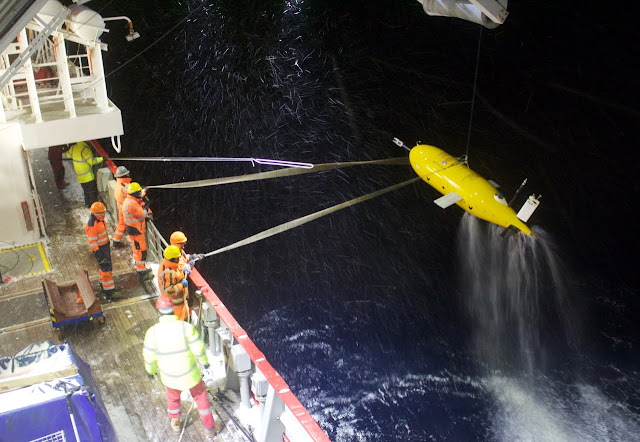 |
| Image credit: Eleanor Frajka-Williams, NOC. |
Our oceans are crucial in regulating global climate and are essential to life on Earth. The marine environment is being impacted severely by multiple and cumulative stressors, including pollution, ocean acidification, resource extraction, and climate change. Scientific understanding of marine systems today and in the future, and their sensitivity to these stressors, is essential if we are to manage our oceans, and achieve the United Nations Sustainable Development Goals (SDGs). However, these systems are complex – with a vast array of interacting physical, chemical, biological and sociological components – and operate on scales of microns to kilometres, and milliseconds to millennia. To address these challenges, modern marine science spans a wide range of multidisciplinary topics, including understanding the fundamental drivers of ocean circulation, ecosystem behaviour and its response to climate change, causes of and consequences of polar ice cap melt, and the impacts of ocean warming on sea level, weather and climate. Marine scientists investigate problems of societal relevance such as food security, hazards relating to sea level rise, storm surges and underwater volcanoes, and understanding the consequences of offshore development on the health of the ocean in the context of building a sustainable blue economy. With the start of the UN Decade of Ocean Science for Sustainable Development in 2021, there is a clear motivation not only for more research, but for sustainable approaches.
However, a key challenge facing all scientists in the near future is the absolute necessity to reduce and mitigate all carbon emissions, achieving ‘Net Zero’. Among many of the high-impact pledges made over recent months, UK Research and Innovation (UKRI) have promised to achieve Net Zero by 2040. UKRI is the umbrella organisation encompassing all of the UK Research Councils including the Natural Environment Research Council, which funds the National Oceanography Centre and British Antarctic Survey to operate the large-scale UK marine research infrastructure.
Whilst marine science is intrinsically linked to Net Zero objectives since the ocean is a major sink of anthropogenic carbon and excess heat, the carrying out marine research itself contributes to the problem in question: ocean-going research vessels use considerable amounts of fossil fuels. Ship-based observations allow scientists to address global challenges, to support ocean observing networks, make measurements not possible via satellite, or in remote and extreme environments. Such observations are essential to establish a thorough picture of how the ocean is changing, and the underlying processes behind the complex interweaving of physics, chemistry, biology and geology within marine systems, but can only continue into the future if the carbon footprint of sea-going research is cut dramatically.
 |
| Image credit: Eleanor Frajka-Williams, NOC. |
The Net Zero Oceanographic Capability (NZOC) scoping review, led by the National Oceanography Centre but supported by researchers from around the UK, is a groundbreaking project aimed at understanding the drivers and enablers of future oceanographic research in a Net Zero world. New technologies and infrastructure – together with multidisciplinary, international approaches, and collaborations with private and public sector stakeholders – are going to be increasingly important to advance understanding of the oceans and climate, while accomplishing Net Zero. The NZOC team are building a picture of a future research ecosystem that capitalises upon emerging technologies in shipping, marine autonomous systems (MAS) sensor technology and data science. Ships will still be an essential linchpin of a new marine observing network, to gather critical information that may not be accessible using MAS, and to enable the maximum value to be extracted from datastreams collected during oceanographic expeditions. The new Net Zero approaches have the potential to not just replace existing marine research capability with one less damaging to the environment, but also to expand and extend it, with new tools available more marine observing, new avenues of research opened up, and wider accessibility. In order to achieve its potential, the development of new systems, and adaptation and improvement of existing methodologies, must be co-designed between technologists and scientists, including modellers and data scientists, as well as those engaged with sea-going observations. Investment in an equitable, diverse and inclusive marine workforce must be considered from the beginning, with engagement in skills training for existing and future marine researchers so that scientists are primed to use the new approaches afforded by a Net Zero approach to their full potential. All of these initiatives have to deliver on their promise in a co-ordinated way and in a short timeframe. Many of them will rely upon global infrastructures and international systems that must similarly adapt at pace.
 |
| Image credit: Eleanor Frajka-Williams, NOC. |
Environmental and climate scientists overwhelmingly and urgently support a move towards Net Zero. However, we cannot overstate the importance of getting the transition to Net Zero right. Whilst an ever-growing number of UK marine scientists are using MAS and low carbon options, NZOC also identified a number of case studies where achieving Net Zero will limit marine science – possibly permanently – if not addressed. These include research areas where scientists need to drill into deep rock, or carry out intricate biological or geochemical experiments and measurements. Any transition to using new methods must be managed flexibly, requiring intersection between old and new technologies, due consideration to accessibility, and verification and validation by the wider scientific community.
Achieving Net Zero is one of the most important societal goals over the next decade. We can not only maintain but also build on marine science capability – essential for meeting Net Zero targets – with equitable and fair strategic planning, co-design of new approaches, and by taking advantage of new opportunities that arise from emerging technologies.
 |
| Dr Katharine Hendry |













